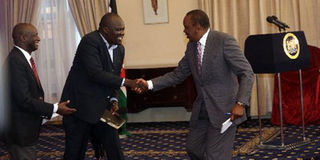To be effective, summits need to push public’s agenda harder

Blogger Robert Alai (centre) and President Uhuru Kenyatta shake hands during the State House Energy Summit at State House in Nairobi on July 27, 2016. With them is Energy Cabinet Secretary Charles Keter. PHOTO | EVANS HABIL | NATION MEDIA GROUP
What you need to know:
Perhaps there is a need for wider representation and diversity in the audience, particularly inclusion of civil society, academia, and trade unions.
And, of course, more gadflies and rabble-rousers from the alternative media and citizen journalism to spice things up.
One might have reason to fear that sparks would fly if President Uhuru Kenyatta and activist-blogger Robert Alai found themselves in the same room.
Yet anyone who found the time on Monday morning to watch the live television broadcast of the State House Summit on Infrastructure would have noted that there were no fisticuffs.
The fact that Mr Alai would be invited to State House for such an event stands as proof positive that we can be a civilised people open to dialogue and genteel competition that does not have to degenerate into violence, threats, and shouting matches. Indeed during the first edition of the State House summits, this one on energy a fortnight earlier, President Kenyatta had occasion to concur with Mr Alai’s critical comments on inefficiencies in the sector, noting that it was rare that he finds himself in agreement with the controversial blogger.
Those who followed the summits would have been engrossed by the depth of discussion on critical economic sectors. Energy, roads, railways, and associated projects are vital to Kenya’s development needs. They are gobbling up billions in public funds and there are legitimate questions on whether taxpayers are getting value for money, and how much is being lost to corruption.
The innovative summits assemble the key players—Cabinet Secretaries, principal secretaries, heads of relevant State corporations—to sit in the same room with representatives from the private sector, the media, and other stakeholders to give updates on their sectors and face hard questions on delivery, or lack thereof. Quite often they will be squirming in their seats, for it is not often that government nabobs more accustomed to throwing their weight around have been put in the public spotlight to justify their pay.
MAY ARGUE
Of course one may argue that it is all a giant pre-election public relations exercise in the best traditions of the style-over-substance Jubilee regime. However, the net effect is that the individuals responsible for not performing on their services to the public are being called out.
The public is able to see the pampered Cabinet Secretaries and other big shots guilty of, among other things, not delivering consistent and reliable electricity to our homes, offices and factories, not building roads where required and to acceptable standards, not ensuring quality education in public schools while taking their own children to pricey private schools locally and abroad, condemning Kenyans to death in dilapidated public hospitals while securing for themselves, at taxpayers’ expense, the best health care money can buy, and looting public funds and leaving nothing in the kitty for development projects.
At the same time it is not a lynch mob. The inquisitors are polite, well-behaved, and knowledgeable. In fact, maybe it is a little too gentle because I find that most of the major private sector captains of industry representing lobbies such as the Kenya Association of Manufacturers, the Kenya Private Sector Alliance, and the Kenya National Chamber of Commerce and Industry are a bit too timid. I do not know whether they are overawed by being at State House or are just conditioned to being mute and pliable in the presence of power, but those are the fellows that should be at the forefront in demanding the infrastructure, services, and regulatory regime vital to business growth.
Perhaps there is a need for wider representation and diversity in the audience, particularly inclusion of civil society, academia, and trade unions. And, of course, more gadflies and rabble-rousers from the alternative media and citizen journalism to spice things up.
All in all, a great initiative, but it needs to be more aggressive if it is to more effectively push the public’s needs and demands.
Oh, and it also provides President Kenyatta the perfect forum to pass the buck downwards. One subtle message from the whole discourse seems to be that Cabinet Secretaries and their minions will be held responsible for failing to deliver on Jubilee election promises. Brilliant.
***
A collection of politicians from Kiambu are proposing Cabinet Secretary Eugene Wamalwa for the governorship of Nairobi. If Mr Ferdinand Waititu, Mr Kanini Kega and others believe Mr Wamalwa would make such a great governor, the logical thing would be to nominate him to become governor of their own Kiambu.
[email protected]; @MachariaGaitho





